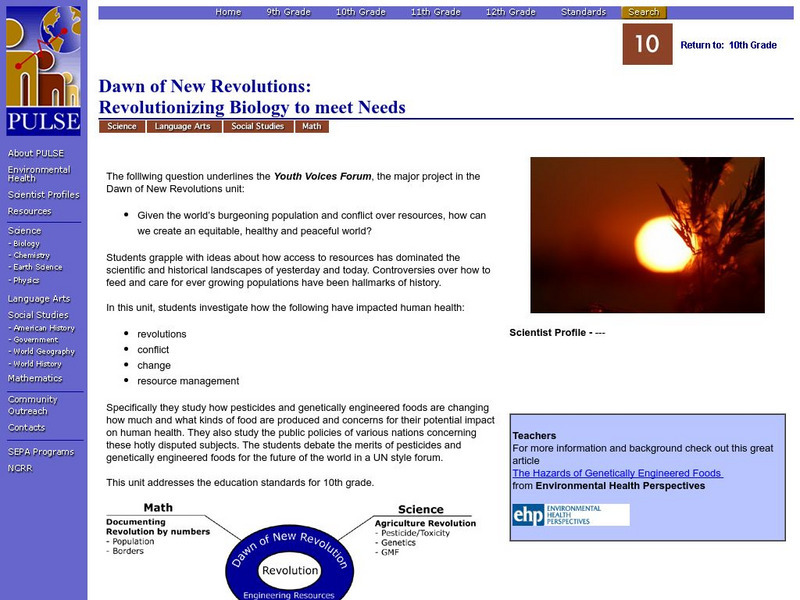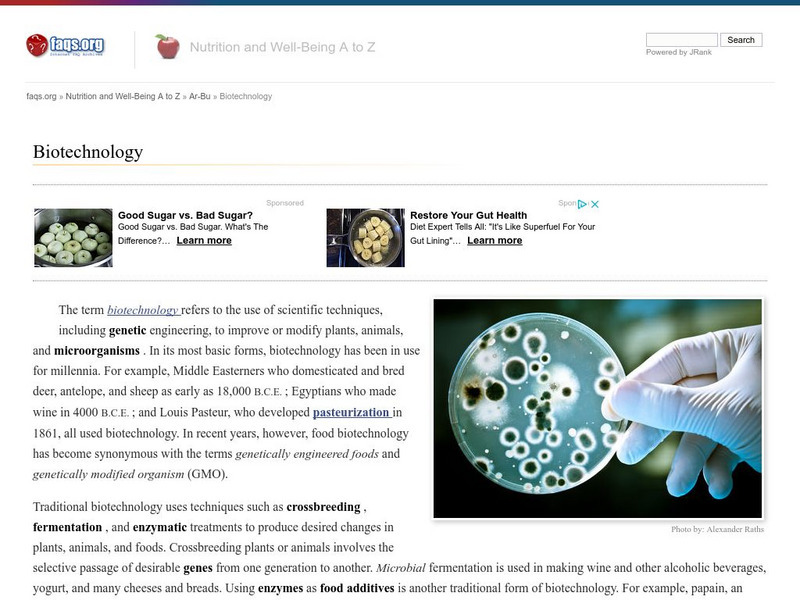Hi, what do you want to do?
Other
Sustainable Table: The Issues: Genetic Engineering
This resource provides information about genetic engineering and gives the concerns people have with genetically modified food. There are also a list of foods that are currently being genetically modified, and also a "Did you know" section.
eSchool Today
E School Today: Your Cool Facts and Tips on Genetic Engineering
Explains a basic concept in genetic engineering, i.e., the genetic modification of living things. Describes how it is done, how it differs from cloning, the benefits it offers, and the concerns people have about this practice.
PBS
Pbs Learning Media: What's Coming to Dinner? Genetically Modified Foods
Browse through a table full of genetically modified (GM) foods to see what's available now and what's to come. From FRONTLINE/NOVA: "Harvest of Fear."
PBS
Frontline and Nova: Harvest of Fear
Review the risks, benefits, hopes, and fears associated with biotechnology and bioengineered food crops. Find in-depth interviews with genetic scientists, food industry representatives, farmers, and critics of biotechnology. Accompanying...
Other
Union of Concerned Scientists: Science for a Healthy Planet and Safer World
The official website for Union of Concerned Scientists provides information on environmental issues and suggestions on actions people can take to curb environmental harm.
Other
Union of Concerned Scientists: Risks of Genetic Engineering
This resource portrays all of the possible risks that could result from genetically engineering foods. Contains links to other sites that features the basics of genetic engineering and alternatives to genetic engineering.
Popular Science
Popular Science: Something Funny Down on the Pharm
This article investigates the growing industry of pharming, or genetically engineering and growing crops in order to produce pharmaceutical drugs. While there is huge potential for this industry, the article concentrates on the...
PBS
Pbs Learning Media: Engineer a Crop: Transgenic Manipulation
You're the geneticist now. In this interactive feature developed for the companion Web site for NOVA/FRONTLINE: "Harvest of Fear," use the latest in genetic technology to engineer your own "supercrop" of tomatoes.
Biotechnology Institute
Biotechnology Institute: Your World: Genetically Modified Food Crops [Pdf]
This issue of Your World will help students unravel conflicting reports about agricultural biotechnology. Is it safe and environmentally friendly or an out-of-control experiment? Students will learn how plants with specific traits are...
University of Arizona
Pulse: Dawn of New Revolutions
A cross curricular unit focusing on how much and what kinds of foods are produced because of pesticides and genetically engineered foods. Students will investigate the impact on humans due to the new technology in food production. Topics...
Other
Ota: Genetic Engineering and Agriculture
A Q&A published by the Organic Trade Association (OTA) about genetically modified organisms (GMOs). This page expresses many doubts, concerns, and assertions about the use of GMOs in agriculture.
Internet FAQ Archive
Faq Archives: Nutrition and Well Being a to Z: Biotechnology
This is a fascinating site that presents an overview of genetic engineering. It discusses concerns with food production and labeling, and global health with biotechnology.
Cold Spring Harbor Laboratory
Dna Interactive: Chronicles
By looking at the history of genetic engineering, this site hopes to show where eugenics has gone wrong and where we have an opportunity to make it right.
TeachEngineering
Teach Engineering: Dna Forensics and Color Pigments
Students perform DNA forensics using food coloring to enhance their understanding of DNA fingerprinting, restriction enzymes, genotyping and DNA gel electrophoresis. They place small drops of different food coloring ("water-based paint")...
PBS
Pbs: Pov Documentaries: Food, Inc.: What Do You Know About Gm Os?
Take this eleven-question quiz to test your knowledge of GMOs. After the quiz, learn more about genetically modified foods by reviewing the correct answers.
CK-12 Foundation
Ck 12: Life Science: Biotechnology in Agriculture
[Free Registration/Login may be required to access all resource tools.] The majority of the corn in the United States is genetically engineered. Corn syrup is used to sweeten many things, like Coke. Corn is also fed to the cows. Learn...
Other
Grace Communications Foundation: The Meatrix
This resource offers short animated videos, interactive activities, and a collection of articles and links about the major issues surrounding sustainable agriculture and factory farming. Such topics discussed are pollution, animal...
PBS
Pbs Teachers: Harvest of Fear
Research and debate the arguments for and against the use of genetically modified foods.
Biotechnology Institute
Biotechnology Institute: Your World: Agricultural Biotechnology [Pdf]
A full-length download of the biotech magazine which discusses agriculture biotech crops- the science involved, the benefits possible, and the concerns people have toward them.
Biotechnology Institute
Biotechnology Institute: Your World: Plant Biotechnology [Pdf]
As humans try to reach the goal of growing enough food to feed all the people, find out how biotechnology is used to help.
Other
Gmfn: u.s. Chemical Giant Monsanto Wields Control
This article has lots of information on the practices of Monsanto, the chemical giant that produces Roundup and Roundup Ready Grains.
PBS
Pbs Teachers: Technology and Ethics
Investigate the meaning of ethics and morality as applied to technology and scientific advances. Research various issues related to scientific, technological and medical advances in the past decade and take a stand on each.
Other
Planet Ark: World Environmental News
Welcome to Planet Ark's daily Reuters World Environment News - the most comprehensive source of environmental news on the Net. To read previous news stories, please use the search engine below to find stories relating to any...
Genome British Columbia
Genome British Columbia: Terminator Technology for Gm Crops
In 1998, American scientists developed terminator seeds which grew into plants that were unable to reproduce. While this practice prevents the dangerous flow of genes to the wild, it has some disadvantages, for example, the added expense...



















